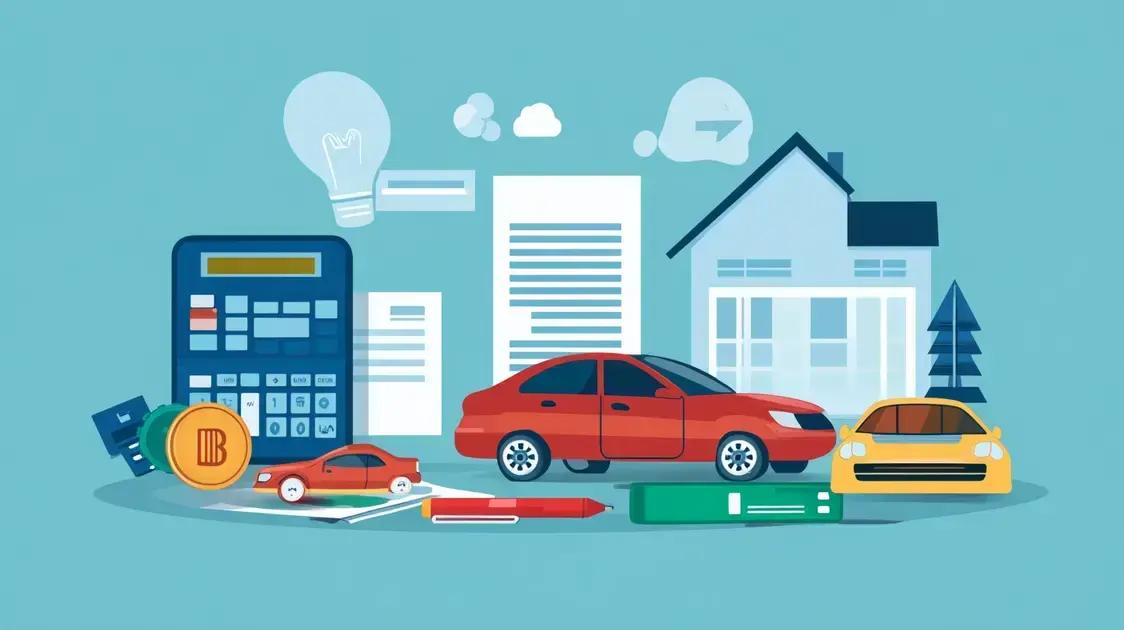Auto loan interest rates are influenced by factors such as credit scores, loan terms, and down payments.
Understanding these elements enables borrowers to secure favorable rates and make informed financial decisions when financing a vehicle.
When considering an auto purchase, understanding auto loan interest rates is crucial for making informed financial decisions.
These rates significantly affect your monthly payments and the total cost of your vehicle.
Understanding Auto Loan Interest Rates
Understanding auto loan interest rates is essential for making informed financial decisions when purchasing a vehicle.
These rates determine how much you will pay in interest over the life of your loan, directly influencing your monthly payments and the total cost of the car.
What Are Auto Loan Interest Rates?
Auto loan interest rates refer to the cost of borrowing money for buying a car.
These rates can be fixed, meaning they stay the same over the life of the loan, or variable, which can change based on market conditions.
Knowing the difference can help you choose the best loan option.
How Are Rates Determined?
Several factors influence auto loan interest rates. Lenders consider your credit score, loan term, type of vehicle, and the overall economic environment.
As your credit score improves, you are likely to receive lower rates, making it essential to manage your credit health.
The Importance of Timing
Auto loan interest rates can fluctuate due to various factors, including changes in the economy and the federal interest rate.
Keeping an eye on rate trends can help you secure a better deal when you’re ready to finance your vehicle.
Loan Terms and Rates
The length of your loan can also impact the interest rate.
Typically, shorter loan terms may offer lower rates but come with higher monthly payments, while longer terms can result in higher rates but lower payments.
Balancing these options is crucial for your budget.
Impact of Down Payments
Making a larger down payment can reduce your loan amount, leading to lower interest rates.
Lenders view borrowers who provide larger down payments as less risky, which can result in favorable terms on your loan.
Factors Influencing Auto Loan Interest Rates
Several factors influencing auto loan interest rates can affect how much you will pay when financing your vehicle.
Understanding these factors can help you make better decisions when applying for a loan.
1. Credit Score
Your credit score is one of the most significant factors in determining your interest rate. Lenders use it to assess your creditworthiness.
A higher credit score typically leads to lower interest rates. Therefore, it is essential to maintain a good credit history.
2. Loan Term
The length of time you will take to repay the loan also matters. Generally, shorter loan terms come with lower interest rates.
However, they also mean higher monthly payments. It’s crucial to choose a loan term that fits your budget without sacrificing a lower rate.
3. Down Payment
A larger down payment can reduce the amount you need to borrow, which may lower your interest rate. Lenders see buyers with substantial down payments as less risky.
If possible, save for a down payment of at least 20% of the car’s price.
4. Type of Vehicle
The type of vehicle you are financing can also influence your interest rate. New cars often attract lower rates than used cars.
Additionally, cars with high safety ratings or those that retain their value may also qualify for better rates.
5. Economic Conditions
The overall economy plays a role in setting interest rates. During periods of economic growth, rates may rise.
Conversely, in an economic downturn, rates may drop as lenders look to stimulate borrowing.
6. Lender Policies
Different lenders have various policies and risk assessments that influence the rates they offer.
It’s important to compare offers from multiple lenders, as your interest rate can vary significantly from one institution to another.
How to Compare Auto Loan Interest Rates

Comparing auto loan interest rates is essential for finding the best deal and saving money over time.
Here are the steps you can take to ensure you get the best rate possible.
1. Gather Loan Offers
Start by collecting loan offers from various lenders, including banks, credit unions, and online lenders.
Make sure you keep the terms consistent, such as loan amount and period, to make your comparison straightforward.
2. Check the Annual Percentage Rate (APR)
The APR is a crucial number because it includes both the interest rate and any additional fees.
Always compare APRs rather than just the interest rates, as this gives a clearer picture of the total loan cost.
3. Understand Loan Terms
Loan terms can vary significantly among lenders. Shorter terms often mean higher monthly payments but lower overall interest.
Longer terms can ease monthly costs but usually come with higher interest rates. Make sure you know what fits your budget.
4. Look for Fees
Some lenders may charge application fees, origination fees, or prepayment penalties.
These can add to the total cost of the loan, so be sure to read the fine print and factor these into your total cost comparison.
5. Consider Your Credit Score
Your credit score can have a major effect on the rates you are offered. If possible, check your credit report before applying.
This ensures that potential lenders won’t see any unexpected surprises when checking your credit.
6. Review Customer Feedback
Before deciding on a lender, take time to read customer reviews.
Experiences from previous borrowers can give insight into the lender’s reliability, customer service, and overall satisfaction.
Tips for Securing Lower Auto Loan Interest Rates
Securing lower auto loan interest rates can save you a significant amount of money over the life of your loan. Here are some effective tips to help you achieve that.
1. Improve Your Credit Score
Your credit score is one of the biggest factors in determining your interest rate.
Check your credit report for any errors and pay down debts to boost your score before applying for a loan.
2. Shop Around
Don’t settle for the first offer you receive.
Compare rates from multiple lenders, including banks, credit unions, and online lenders, to find the best deal that suits your financial situation.
3. Consider a Larger Down Payment
A larger down payment can reduce the total amount you need to finance, which may encourage lenders to offer you a lower interest rate.
Aim for a down payment of at least 20% if possible.
4. Choose a Shorter Loan Term
Shorter loan terms often come with lower interest rates. Although your monthly payments may be higher, the overall interest you’ll pay is usually less.
Find a balance that fits your budget.
5. Time Your Purchase
Interest rates can fluctuate based on economic conditions.
If possible, time your loan application when rates are lower or during promotional periods when lenders may offer special incentives.
6. Obtain Pre-Approval
Getting pre-approved for a loan gives you a better idea of the rates and terms you can expect.
This not only helps you budget effectively but can also bolster your negotiating power with dealers.
The Impact of Credit Scores on Auto Loan Interest Rates
Your credit score plays a significant role in determining the interest rates for your auto loan. Lenders use your credit score to assess the risk they take when lending you money.
A higher score indicates that you are more likely to repay your loan on time, which generally results in lower interest rates.
Understanding Credit Score Ranges
Credit scores typically range from 300 to 850. Here’s a simple breakdown of how your score can impact loan rates:
- 300-579: Considered poor; expect higher interest rates.
- 580-669: Fair; rates are often above average.
- 670-739: Good; may qualify for lower rates.
- 740-799: Very good; likely to receive competitive rates.
- 800-850: Excellent; the best rates available.
The Role of Credit History
Besides the score, lenders also look at your credit history. This includes your payment history, credit utilization, and any negative marks like bankruptcies or foreclosures.
A clean and positive history can significantly influence your interest rate.
How to Improve Your Credit Score
If you’re concerned about your credit score before applying for an auto loan, consider taking steps to improve it.
Paying down existing debts, making timely payments, and avoiding new hard inquiries can help raise your score over time.
Impact of Multiple Inquiries
When you shop for loans, multiple inquiries can temporarily lower your score.
However, if you shop within a short period (usually 14 to 45 days), these inquiries typically count as one for scoring purposes.
This gives you the ability to compare rates without significant damage to your credit.
Common Myths About Auto Loan Interest Rates

There are many common myths about auto loan interest rates that can mislead borrowers.
Understanding these myths can help you make more informed decisions when applying for an auto loan.
Myth 1: All Lenders Offer the Same Rates
Many people believe that all lenders offer comparable rates, but this is not true.
Different lenders have varying interest rates based on their policies, your credit score, and other factors. It’s important to shop around for the best deal.
Myth 2: A Higher Loan Amount Means Lower Rates
Some borrowers think that taking out a larger loan automatically leads to a lower interest rate.
In reality, interest rates are influenced more by your credit score and loan term than the loan amount itself. Always consider your financial situation carefully.
Myth 3: You Should Only Focus on the Interest Rate
While the interest rate is important, it is not the only factor to consider.
You should also look at the overall terms of the loan, including fees, loan duration, and any penalties. These components can greatly affect the total cost of the loan.
Myth 4: Pre-Approval Guarantees the Best Rate
Many assume that being pre-approved ensures they will receive the lowest interest rate.
While pre-approval helps provide a better idea of what you can afford, lenders may still change their rates based on market conditions or additional factors when you finalize the loan.
Myth 5: Your Interest Rate is Set in Stone
Some borrowers think their interest rate will never change after signing the loan papers.
However, rates can sometimes be renegotiated, especially if you make timely payments or improve your credit score.
It’s beneficial to stay informed and discuss options with your lender.
Myth 6: Your Employer Can Influence Your Rate
It’s a common belief that working for a reputable company can get you a better interest rate.
In most cases, your income source does not affect your loan’s interest rate as much as your credit history and financial habits do.
Understanding Auto Loan Interest Rates
Grasping the nuances of auto loan interest rates is essential for every borrower looking to finance a vehicle.
From understanding how credit scores impact rates to debunking common myths, knowledge empowers you to make informed decisions.
Always remember to shop around, compare multiple offers, and consider all loan terms, not just interest rates.
By following the tips outlined in this guide, you can position yourself to secure a rate that fits your financial situation.
Auto loans may seem daunting, but with the right information and strategies, you can navigate the lending landscape effectively and find a loan that works for you.





